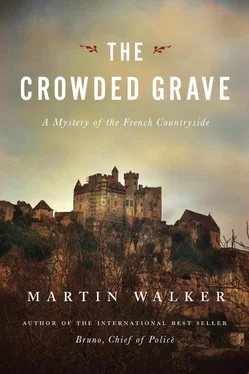Martin Walker - The Crowded Grave
Здесь есть возможность читать онлайн «Martin Walker - The Crowded Grave» весь текст электронной книги совершенно бесплатно (целиком полную версию без сокращений). В некоторых случаях можно слушать аудио, скачать через торрент в формате fb2 и присутствует краткое содержание. Жанр: Полицейский детектив, на английском языке. Описание произведения, (предисловие) а так же отзывы посетителей доступны на портале библиотеки ЛибКат.
- Название:The Crowded Grave
- Автор:
- Жанр:
- Год:неизвестен
- ISBN:нет данных
- Рейтинг книги:5 / 5. Голосов: 1
-
Избранное:Добавить в избранное
- Отзывы:
-
Ваша оценка:
- 100
- 1
- 2
- 3
- 4
- 5
The Crowded Grave: краткое содержание, описание и аннотация
Предлагаем к чтению аннотацию, описание, краткое содержание или предисловие (зависит от того, что написал сам автор книги «The Crowded Grave»). Если вы не нашли необходимую информацию о книге — напишите в комментариях, мы постараемся отыскать её.
The Crowded Grave — читать онлайн бесплатно полную книгу (весь текст) целиком
Ниже представлен текст книги, разбитый по страницам. Система сохранения места последней прочитанной страницы, позволяет с удобством читать онлайн бесплатно книгу «The Crowded Grave», без необходимости каждый раз заново искать на чём Вы остановились. Поставьте закладку, и сможете в любой момент перейти на страницу, на которой закончили чтение.
Интервал:
Закладка:
Martin Walker
The Crowded Grave
Prologue
For once, the chef de police of the small French town of St. Denis was carrying a gun. That morning Benoit Courreges, known to everyone as Bruno, had taken his official weapon from the office safe in the mairie where it stayed throughout the year, except for his annual firearms refresher course at the police range in Perigueux. He had cleaned and oiled the elderly MAB 9mm carefully, and it was now tucked into the leather holster that he had polished just after dawn, along with the belt and the shoulder strap he hardly ever wore. His full dress uniform smelled faintly of the dry cleaner’s where he had picked it up on the way to the mairie that morning. His hair was newly cut, his morning shave had been unusually close, and his boots were polished to the kind of brilliant shine that only a former soldier can achieve.
Beside him, Sergeant Jules and the rest of the small team that staffed the Gendarmerie of St. Denis stood in formal ranks in front of their modest stucco-fronted building. The gendarmes also wore full dress uniform, and it would have taken a careful observer to note any difference between their dress as functionaries of the French state and Bruno’s as an employee of the town of St. Denis. On the flat roof of the gendarmerie, beside the radio antenna, the tricolor flew at half-mast, and above the door was a plaque of the flaming grenade that had been the symbol of the gendarmes since their founding in 1791. Of Capitaine Duroc, the nominal head of the post, there was no sign. He had called in sick, to avoid rather than disobey the official order that the police and gendarmes of France should not formally commemorate the death of Brigadier Nerin. But here in St. Denis, as in police stations and gendarmeries across France, the rank and file and many of the officers had chosen to mark his killing with a parade of honor. Over a glass of wine the previous evening, Bruno had arranged with Jules that he would read out the brief statement and lead the parade. Employed by the mairie, Bruno was thus less at risk than the sergeant of an official reprimand or even demotion. And Jules had his pension to consider.
Now Bruno checked his watch for the precise time. He came to attention, marched forward, and turned to address the gendarmes. He noted that each of them, men and women alike, was wearing the same black armband of mourning that he had attached to his own right sleeve. A small knot of townsfolk stood in silence, watching. Bruno nodded at the young boy who stood to one side, dressed in a gray shirt and black tie and carrying a bugle.
“Respected colleagues,” Bruno began. “We are here to mark the death on active duty of Brigadier of gendarmes Jean-Serge Nerin. He was murdered at Dammarie-les-Lys in the Departement of Seine-et-Marne while hunting down the terrorist cell that killed him. This is the first killing of a French policeman by the Euskadi Ta Askatasuna, the ETA, the Basque terrorists who have already killed more than eight hundred people in Spain. Death on active service has always been a risk in our profession, but murder by terrorists is a special event. Our colleagues across France have agreed, despite official discouragement, that we shall all observe a minute of silence in honor of our fallen comrade Brigadier Nerin.”
He paused and then, in his best parade-ground voice, called out “A mon commandement.”
The line of gendarmes braced, ready for his next command.
“Escadron, garde a vous.”
They came to attention and Bruno raised his right arm to the brim of his hat in salute, the signal he had prepared with young Jean-Michel. The boy raised the bugle to his lips and blew the first haunting note of the “Sonnerie aux Morts,” the bugle call that the Garde Republicaine played for its dead. When the final three notes faded away, Bruno began to count in his head for the full minute of silence, his arm becoming heavier so that he had to make a deliberate effort to keep his hand from quivering. Finally it was over. He lowered his hand and dismissed the parade.
Sergeant Jules was the first to come across and shake his hand, and then each of the gendarmes, male and female, followed suit as they filed back into the gendarmerie. Bruno went across to Jean-Michel and thanked him and then walked in silence along the rue de Paris, back toward his office in the mairie and the safe where he would lock away his pistol for another year. He crossed the main square and turned in at the narrow iron-studded door, avoiding the public entrance with the modern elevator and preferring to climb the ancient stone steps. At the top, he found the mayor filling his pipe and waiting patiently for his arrival.
“Thank you for being there,” Bruno said. “I saw you in the crowd.”
“Thank you for doing this, Bruno, and the music was a lovely touch. It will be a sad day if France fails to honor those who fall for the Republic. I saw Capitaine Duroc had once again managed to extract himself from an embarrassing situation.”
“Well, sir, luckily I only have to answer to you, not the government of France.”
The mayor’s eyes twinkled. “Ah, Bruno, how very nice of you to say so. If only it were true.”
1
It felt like the first morning of spring. The early sun was chasing the mist from the wooded hollows that sheltered the small streams flowing busily down to the River Vezere. Drops of dew sparkled on the new buds that seemed to have appeared overnight on the bare trees. The air smelled somehow different, fresh and hopeful, and enlivened by the tuneful notes of a dozen different birdsongs. Excited by the change in scents and season, even after his early morning walk through the woods, Gigi the basset hound thrust his nose at the open window of the small police van that descended the steep and curving lane from his master’s home. At the wheel, Bruno was singing a half-remembered song about springtime in Paris and vaguely thinking of the duties of the day that stretched before him, when rounding the last bend he was suddenly forced to brake.
For the first time in his memory, the quiet road ahead was blocked with a line of cars and tractors, their engines running and their drivers’ heads poking from windows. Some were out of their cars, looking at the road that led to St. Denis. Several were talking urgently into cell phones. In the distance a car horn sounded, swiftly joined by others in discordant chorus. As Bruno surveyed the scene his own phone began to ring. He checked the screen, recognized the name of Pierre, a neighbor who lived farther up the road. He ignored it, assuming Pierre would be calling to complain at being stuck in the jam ahead. There had to be an accident of some sort.
Bruno pushed aside the thought that he could have avoided this delay if he’d stayed the night with Pamela, the Englishwoman he’d been seeing since the autumn. She had called off the arrangement that he would dine with her and stay the night, saying she’d finally secured an early morning appointment with the marechal, the traveling farrier who was to reshoe her horses. Pamela postponed their meetings too frequently for Bruno’s comfort, and he was never quite sure whether she was cooling on their relationship or simply wary of commitment. They were to meet again that evening, he reminded himself, without feeling greatly reassured. He parked the van and climbed out to investigate. The best view of the long traffic jam was commanded by Alain, who kept a dairy farm farther up the road to Les Eyzies.
“Geese-the road’s full of ducks and geese,” he called down to Bruno from his perch high on a tractor. “They’re all over the place.”
Bruno heard the sound of rival honking as the geese called back in response to the car horns, and he quickly clambered up beside Alain to peer ahead. The traffic jam stretched as far up the road as he could see. Darting between the stalled cars were perhaps hundreds of ducks and geese, streaming through the woods on the side of the road and heading across it to settle in a broad pond that spread across the meadow, swollen by the spring rains.
Читать дальшеИнтервал:
Закладка:
Похожие книги на «The Crowded Grave»
Представляем Вашему вниманию похожие книги на «The Crowded Grave» списком для выбора. Мы отобрали схожую по названию и смыслу литературу в надежде предоставить читателям больше вариантов отыскать новые, интересные, ещё непрочитанные произведения.
Обсуждение, отзывы о книге «The Crowded Grave» и просто собственные мнения читателей. Оставьте ваши комментарии, напишите, что Вы думаете о произведении, его смысле или главных героях. Укажите что конкретно понравилось, а что нет, и почему Вы так считаете.












